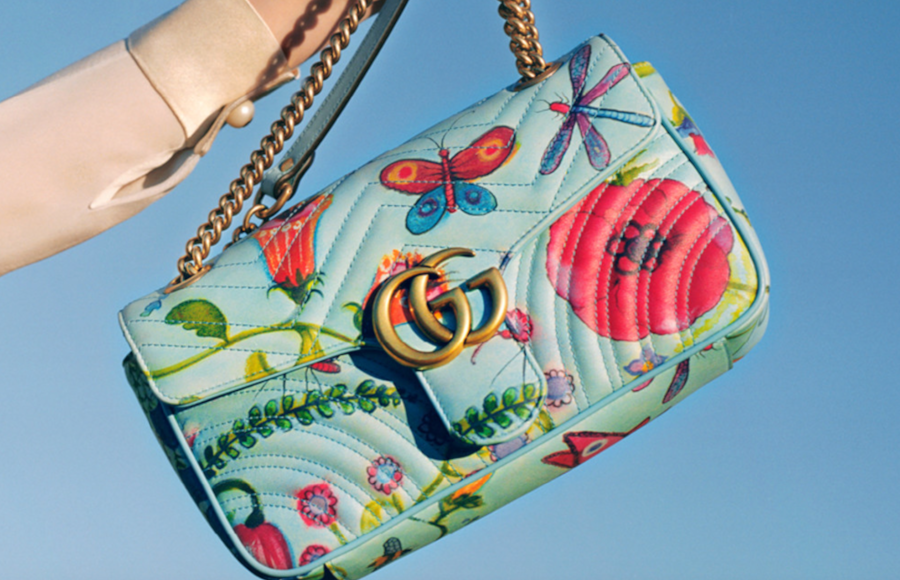
image: Gucci
The fashion industry was rocked when a slew of big-name fashion figures became the targets of Italian tax evasion crackdowns over the past several years. Dolce & Gabbana founders Domenico Dolce and Stefano Gabbana, Prada’s chief executive officers Miuccia Prada and Patrizio Bertelli, Giorgio Armani, the Bulgari family, and former Valentino chairman Matteo Marzotto, among others, came under the Italian tax authority’s microscope for allegedly failing to pay up.
These are extreme cases, but what about the smaller instances of tax side-stepping that could be happening with some regularity in fashion in connection with the incessant practice of gifting?
As Racked noted this week, “Nearly every brand sends gifts to editors … it’s the best way to rise above competition in the hopes of making it into roundups and reviews.” The same can be said when brands give out gifts at their runway shows, whether they be in the traditional fashion week setting or as part of extravagant pre-season getaways.
Given the oft-meager paychecks that come with working in fashion and media; in light of the “excess, like wrong sizes mindlessly sent over, or just the overflow of product in general that no one’s held accountable for;” and in lieu of company policies (at many publications) prohibiting editors from selling these gifts, that is just what industry insiders have taken to doing. Off-loading the gifts and pocketing the profits.
An Age-Old Practice
This is hardly a novel practice. As the New York Post noted in 2003, fashion editors and models, alike, have been lugging in hordes of designer wares to upscale consignment shops in Manhattan. This is why, for years, many show-exclusive garments and accessories routinely showed up at Tokio 7, a consignment shop in New York’s East Village, for instance, or on eBay or other marketplace sites.
Nowadays, The RealReal and other similarly situated resale websites are proving a popular avenue, largely due to the higher level of anonymity that they provide for their sellers. On The RealReal, for example, in lieu of listing individual sellers by name, everything is marketed, sold, and shipped by The RealReal.
But this practice is larger, per Racked, than editors merely selling off a few garments and/or accessories each season. No, it is a near-constant exercise into which the resources of big-name publications, as distinct from individual editors, are increasingly being utilized, and through which individuals are supplementing their primary income.
According to Racked, one “former Teen Vogue assistant, who worked for the magazine’s fashion director, says that as part of job training, she became proficient in scheduling, expenses — and selling her boss’s swag on The RealReal … The assistant would collect her boss’s gifts for pickup at least twice a month and schedule messengers to send pieces to The RealReal’s New York consignment office on Condé’s dime.”
Ethical? What about Legal?
Views on the resale economy are mixed. “No one seemed to feel like there was any [shadiness] involved,” one source told Racked. “An underground economy of editors who profit off fashion brands is unethical,” said another. Putting aside the complex ethics of the matter, what about the legality?
Why is this a legal matter, you ask? Well, given that these gifts are being resold to supplement individuals’ income, they must be taken into account in one way or another come April, when Americans file their individual income tax returns. At least one fashion industry insider, who has sold products that she received as gift from brands, told TFL – in a strictly confidential capacity – that but for receiving professional tax advice, she would not have known to report money earned as a result of reselling gifted products. “They are gifts, after all,” she said.
The large-scale frequency with which many individuals – regardless of whether they work in the fashion industry – appear to be unaware of their income tax obligations when it comes to gifts, suggest that failure to adequately address them in a tax capacity is certainly feasible.
Income Means Income
In the words of the Internal Revenue Service (“IRS”), “Generally, an amount included in your income is taxable unless it is specifically exempted by law.” One such exemption: Gifts … of minimal value. This tends to include “flowers, fruit, books, etc., provided under special circumstances,” according to the IRS.
What is not exempt? Non-de mininis gifts, such as $1,500 Gucci jumpers, for example, or $3,300 smaller Chanel bags. As Forbes’ tax columnist Robert W. Wood states, “Income means income from all sources. If you sell unwanted clothes, cars, furniture, even family heirlooms, are they taxed? You bet. If you sell something for $100 you bought for $50, that’s a $50 gain.”
While the U.S. government passed legislation in 2011 requiring that payment settlement entities – such as eBay, Amazon, and most relevantly for fashion folks, The RealReal, Vestaire Collective, and other upscale consignment sites – file a new form, the Form 1099-K, that only impacts the sellers on their platforms who exceed $20,000 in gross sales and 200 transactions in a calendar year.
This means that, at least in theory, industry insiders who sell 200 products or less and that bring in a total of $20,000 or less in sales on those items, will not be on the receiving end of a 1099-k form from these sites and thereby, might be able to bypass – either intentionally or not – declaring such income on their annual tax return without any red flags from the IRS.
Given the seeming lack of tax exemptions for fashion’s certainly-not-de minimis gifts, those selling off their designer garments and accessories are accumulating money for items that they did not pay for in the first place, and thereby, are subjected to tax implications in connection with that income.
With that in mind, this is one place where fashion could be sorely lacking in terms of adherence to the law, and an area that is worthy of some attention before April 2018.







